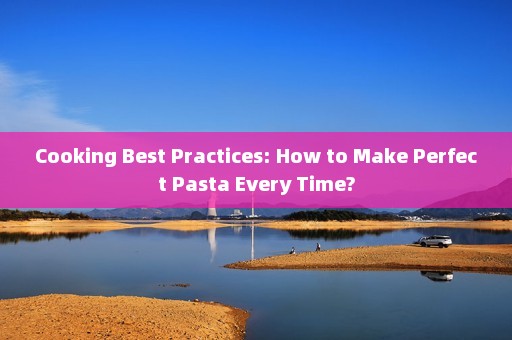It was a crisp autumn evening, and the scent of garlic and basil filled the air of my small kitchen. As the sun set over the horizon, casting a warm glow through the window, I found myself once again facing a culinary challenge: making the perfect pasta. It's a task that seems simple, yet so many factors can affect the outcome. Join me as I share my journey to mastering the art of pasta-making, and learn how to achieve al dente perfection every time.

Choosing the Right Ingredients
Great pasta starts with great ingredients. The type of pasta and the quality of the ingredients can make or break your dish. My personal favorite is Italian-grown durum wheat pasta, which has a higher protein content, resulting in a firm texture that holds up well during cooking.
Pasta and Water Ratio
One of the most common mistakes people make is not using enough water. The general rule of thumb is to use 4 quarts of water per pound of pasta. This ensures that the pasta has enough room to move around and cook evenly. Using a large pot is crucial to prevent overcrowding, which can lead to sticky, undercooked pasta.
Perfectly Salted Water
Salting the water is essential for flavor. I once read that adding salt to the water makes the pasta taste like the ocean. While that may sound appealing, the reality is that it brings out the flavor of the pasta itself. The general guideline is to add about 1 tablespoon of kosher salt for every 4 quarts of water. This may seem like a lot, but trust me, it makes a world of difference.
Boiling Point
Timing is everything when it comes to cooking pasta. Once you've added the pasta to the pot, it's crucial to bring the water back to a rolling boil as quickly as possible. This prevents the pasta from sticking together and ensures even cooking. If the water takes too long to return to a boil, you risk overcooking the outer layers of the pasta while the center remains underdone.
Stirring and Testing
Stirring the pasta occasionally during cooking helps prevent sticking and ensures even cooking. It's also important to taste the pasta periodically to gauge doneness. The package instructions usually provide a cooking time, but this can vary based on the pasta shape and brand. I've found that al dente pasta should have a slight bite to it, without being too soft or too firm.
Reserving Pasta Water
One of the most overlooked steps in pasta-making is reserving some of the cooking water before draining the pasta. This water contains starches that help thicken the sauce and create an cohesive consistency. I always set aside a cup or two of the pasta water, just in case my sauce needs a little extra help.
Saucing and Serving
Once the pasta is cooked to perfection, it's time to add the sauce. I like to toss the pasta with the sauce in the pot I used for cooking, ensuring that every strand is evenly coated. If the sauce is too thick, I add a little reserved pasta water to loosen it up. And finally, I garnish with fresh herbs and a sprinkle of grated cheese to add that finishing touch.
By following these cooking best practices, you'll be well on your way to making perfect pasta every time. Remember, practice makes perfect, and with each attempt, you'll gain valuable insights and improve your technique. So, embrace the art of pasta-making, and enjoy the journey to culinary bliss.
Post a comment

Comment List